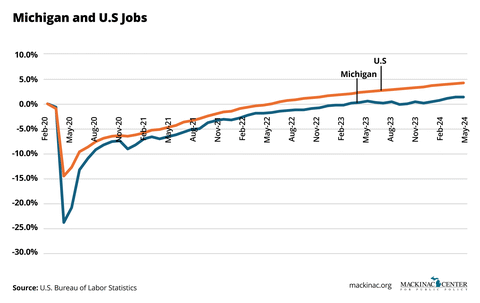Michigan lags nationwide COVID recovery
Data say Michigan businesses saw more closures than the national average
Michigan’s job recovery has become the fifteenth weakest recovery in the United States since the 2020 Covid pandemic, according to economic indicators that contradict state officials’ claims of a strong economic rebound.
The Michigan Economic Development Corporation announced in a recent press release that CNBC ranked Michigan ninth among states to do business. Instead of objective statistics, CNBC compiled rankings based on “attributes they [the states] use to sell themselves.”
However, Michigan job recovery is only up 1.2% from pre-pandemic levels, compared to the US average increase of 4.1%. Michigan recovered all of its COVID job losses in April 2023, while the average state had recovered by June 2022.
Critics say Whitmer administration policies have slowed the state’s recovery.
Michigan’s economic recovery lagged that of many other states because Gov. Gretchen Whitmer’s COVID policies and post-lockdown decisions by the Legislature were “often the exact worst way to go about bringing Michigan’s economy back,” John Mozena, the President of the Center for Economic Accountability, told CapCon in an email.
“Stubborn central planners dug Michigan into a deep economic hole during COVID,” Mozena said, “and once the lockdowns were over, they just kept digging, certain in their belief that they’d eventually find buried treasure.”
The Bureau of Labor Statistics found that 32% of Michigan businesses suffered mandated closure during the pandemic, compared to the national average of 19%.
Population growth in Michigan, an indicator of economic health, has stagnated at 10 million for the past generation. And for the past two years, more people have moved out of Michigan than in. The U.S. average population has grown by 19% since 2000.
Michigan jobs haven’t returned to the levels they were in 2000. The average state has added one job for every five jobs held in 2000. Michigan is down one job for every 20 jobs it had in 2000, according to the BLS.
In June, Whitmer announced 38,000 auto jobs that weren’t actually created. Since 2019, Michigan has lost more than 2,600 auto jobs.
Detroit carmakers were out-manufactured by foreign competitors for the first time last year, the Detroit News reported. The Detroit Three have also announced large state layoffs. The state has lost 4,200 auto and auto parts manufacturing jobs in the past year, compared to the 46,500 added by the rest of the country over the same period.
The Michigan unemployment rate was 3.9% in May 2024, compared to the 3.7% rate in February 2020.
In 2023, the Mackinac Center for Public Policy released a study recommending how to grow Michigan’s economy. The study recommends tax cuts and free market principles. These are in stark contrast to recent policy moves. Michigan lawmakers have also raised income taxes, repealed the state’s right-to-work, and promised $4.4 billion of taxpayer dollars in corporate subsidies.
Michigan Capitol Confidential is the news source produced by the Mackinac Center for Public Policy. Michigan Capitol Confidential reports with a free-market news perspective.



 Michigan ranked 34th for population growth over four years
Michigan ranked 34th for population growth over four years
 COVID cash grew government in Michigan
COVID cash grew government in Michigan
 Data counter Whitmer’s claim of growing Michigan
Data counter Whitmer’s claim of growing Michigan
